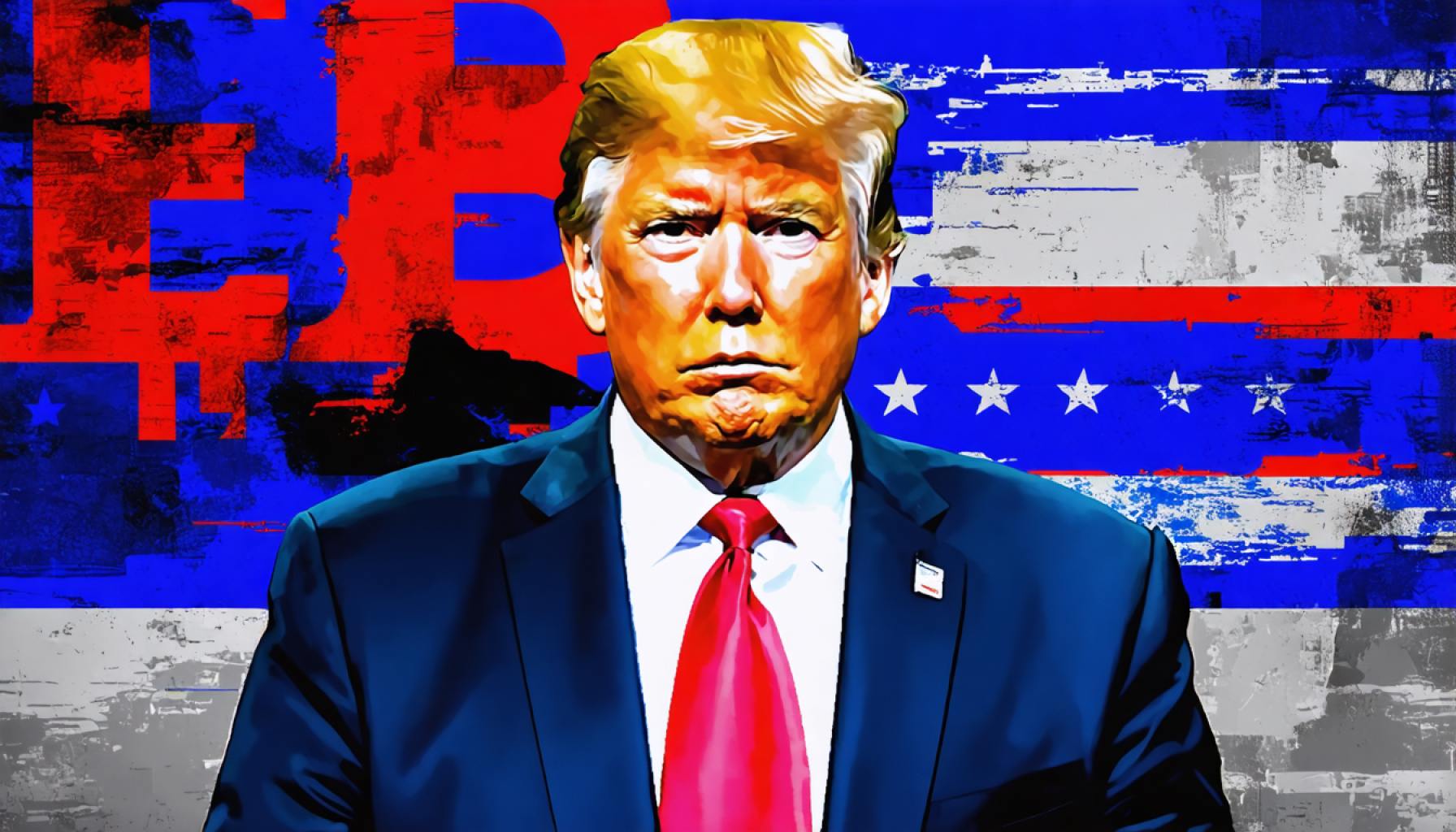- The Democratic Party is experiencing a transformative shift as it engages with the cryptocurrency industry, raising questions about its core values and future direction.
- Historically aligned with financial regulation, Democrats’ move towards crypto signals a potential departure from longstanding principles established during the New Deal era.
- The collaboration between Democrat Ritchie Torres and Republican Tom Emmer in the Congressional Crypto Caucus highlights bipartisan interest in cryptocurrency.
- Cryptocurrencies challenge traditional financial safeguards, lacking the protections offered by institutions like the FDIC.
- Cryptocurrency volatility and the absence of regulatory mechanisms remain significant barriers to widespread adoption.
- The political landscape is influenced by substantial crypto donations, though leading crypto political action committees show a preference for Republicans.
- The Democrats face a pivotal decision: embrace crypto’s potential while risking their regulatory legacy, or maintain their regulatory stance and core values.
A strange twist has befallen the Democratic Party, whose storied history once aligned them with the working class and stringent financial regulations. Their new dance with the cryptocurrency industry has provoked questions about identity, allegiance, and future directions. The Democrats once prided themselves on building a robust regulatory infrastructure—the same system that cryptocurrencies are designed to bypass. Now, their flirtation with digital tokens raises more than a few eyebrows.
Imagine the spectacle: Representative Ritchie Torres, a Democrat serving the South Bronx, one of America’s most impoverished districts, collaborating with Republican Tom Emmer to lead a Congressional Crypto Caucus. It’s a partnership that seems as unlikely as oil and water mingling effortlessly. Republicans have historically backed cryptocurrency with unified support, viewing it as an embodiment of free-market ideals and deregulation. Only a few GOP members have ever dared to vote against measures to relax limits on cryptocurrencies.
The Democrats’ pivot towards the crypto universe represents a seismic shift—akin to the party adopting the very principles it once denounced. Historically, the Democrats broke away from stringent “hard money” policies over a century ago to embrace developmental fiscal policies that aimed to bolster underdeveloped regions. Franklin D. Roosevelt’s New Deal policies further emblazoned the party’s dedication to financial stability and protections for ordinary Americans by creating institutions like the FDIC, which offered a safe haven for depositors through federally insured savings.
Even as cryptocurrencies promise liberation from high traditional banking fees—an argument many pro-crypto Democrats wield—the digital realm’s lack of safeguards places it at odds with the guiding principles established during the New Deal. Without an equivalent to the FDIC’s insurance or the Federal Reserve’s ability to manage money supply during downturns, cryptocurrencies inherently pose high risks to financial stability.
On the political chessboard, cryptocurrency’s influence is a formidable force indeed, with crypto sector donations nearly dividing the political arena in half. Yet, even with significant concessions from Democratic leaders, the top crypto political action committees favored Republicans, propelled by the Trump administration’s audacious plans to establish a national bitcoin stockpile.
Those within the cryptocurrency community acknowledge the perpetual challenge of volatility—a barrier impeding widespread adoption. Cryptocurrencies remain precariously sensitive to investor whims, lacking the stabilization mechanisms associated with traditional financial systems.
Looming over all is the specter of a Trump administration bent on reshaping the financial landscape. A strategic state-backed bitcoin reserve aims to embed cryptocurrency deeper within national policy, even as proposals threaten the structural integrity of long-standing financial regulatory bodies like the FDIC.
The Democrats now find themselves at a crossroads. To win over the burgeoning crypto industry, they need more than cosmetic deregulation. They might have to brace for a transformative return to pre-New Deal financial policies, potentially risking alienation from their core constituencies.
The Democratic Party faces a critical choice: pursue the techno-gold of crypto and risk a foundational pivot, or reaffirm their legacy of regulation and protection. The stakes are high as the party navigates these perilous waters, and the outcome could redefine their political identity for decades to come.
Democrats and Cryptocurrency: Navigating Identity, Allegiance, and Future Trajectories
The Evolving Dynamics of Democrats and Cryptocurrency
The Democratic Party’s engagement with cryptocurrency marks a notable shift, pulling them into complex conversations about identity, allegiance, and policy direction. Once staunch proponents of financial regulation, Democrats’ current flirtation with digital currencies introduces new questions about their political identity.
Key Questions and Insights
1. What Drives Democrats Toward Cryptocurrency?
Historically, Democrats have championed robust regulatory frameworks, as evidenced by Franklin D. Roosevelt’s New Deal. However, the promise of financial inclusivity, lower banking fees, and innovation has led some Democrats to reconsider their stance. The allure lies in leveraging blockchain technology for economic development while potentially accessing new political contributions from a wealthy emergent sector.
2. How Does Cryptocurrency Challenge Democratic Principles?
Cryptocurrencies bypass traditional regulatory systems, offering a decentralized financial alternative with minimal oversight and insurance safeguards. This contradicts legacy Democratic policies aimed at financial stability and consumer protection, such as those instantiated by the FDIC.
3. What Are the Market Forecasts and Trends?
The cryptocurrency market continues to grow, driven by both retail and institutional investments. While volatile, the market is projected to reach greater mainstream adoption through innovations such as decentralized finance (DeFi) and non-fungible tokens (NFTs). Democrats’ engagement signals a recognition of the inevitable fintech transformation.
_For more insights on current financial trends, check ou_ Forbes.
Pros and Cons Overview
Pros:
– Innovation Encouragement: Democrats can position themselves as pro-innovation, appealing to tech-forward millennials.
– Financial Inclusion Potential: Cryptocurrency might provide banking alternatives for underbanked communities.
Cons:
– Regulatory Dilemmas: Aligning with crypto can be seen as abandoning core regulatory philosophies.
– Market Volatility: High token volatility poses apparent financial risks lacking traditional protections.
Real-World Use Cases
Cryptocurrency can bolster economic activity in underbanked districts, such as the Bronx. Through crypto and blockchain-based services, communities can explore financial empowerment without reliance on banking infrastructure.
_For further exploration of digital innovations, visit_ Wired.
Controversies and Limitations
– Volatility: Cryptocurrencies remain highly speculative and are often too volatile for risk-averse users.
– Environmental Concerns: Bitcoin mining, for instance, is energy-intensive, raising environmental sustainability questions.
Actionable Recommendations
– Prioritize Consumer Education: Tools to inform and protect users about crypto risks are essential.
– Develop Regulation Balance: Craft policies that encourage innovation while addressing potential financial system vulnerabilities.
Conclusion
As the Democratic Party navigates these new waters, their challenge is monumental: balancing innovation with regulation to safeguard their legacy. The outcome will not just influence their future political identity but potentially reshape the American financial landscape.










